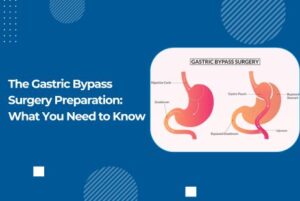The gastric bypass and other invasive techniques of weight loss are collectively called Bariatric surgeries. Ideally, you can get one of these surgeries if you have a robust body that can endure the procedure and adjust accordingly. So experts always emphasise on preparing your body for at least six months before bariatric surgeries.
Preparing the body in advance is very beneficial, and the surgery results will also be sustainable. Generally, patients are advised to make lifestyle changes by adopting a “clean diet” and “exercise” as they significantly influence the success of weight loss surgery.
If you are not clear on why and how to prepare for weight loss surgery, we explain its importance and instructions in detail further.
Why Should I Prepare For Weight Loss Surgery?
The weight loss surgery would be sustainable only if you have already made lifestyle changes and are willing to continue them. Dietary changes are essential if you opt for bariatric surgery. Research shows that patients lose 1.8% of body mass for every 1% they had lost before the surgery.
Losing weight before the surgery through exercise and dieting also puts you in the weight-loss mindset. Your stomach will be noticeably smaller after the surgery but that alone won’t be enough. A smaller stomach will limit hunger, but sudden diet-cut can disturb the body’s internal digestive and metabolic system. Therefore, the body should adjust to limited intake before surgery. This means you have to start getting used to eating less before the procedure.
As guided by your surgeon, you have to switch to a low-calorie diet full of nutrients, which will stimulate weight loss and heal and recover the body after weight loss surgery.
How To Prepare For Weight Loss Surgery?
Here are some quick pointers to note:
- Lower your daily calorie intake between 1200 -1500 calories or as prescribed by your surgeon or nutritionist for a weight loss program.
- Start with small weight loss goals, and intensify as you accomplish them.
- Avoid caffeinated, sugary, and carbonated drinks.
- Avoid smoking as it would defer post-op healing.

Changing Your Diet
Consult your surgeon or a nutritionist to understand your diet changes. Eating fewer carbohydrates and foods rich in protein and fibre allows your body to use the stored fat. It will also give you more energy, making exercise easier and more enjoyable.
Eating poultry, fish, vegetables, fruits, and other fibrous and protein-rich foods is the way to go. Limit the intake of processed foods such as canned goods, deli meats, and sugary and fizzy drinks. In addition, keep the portions small to support your digestion. You should aim to consume no more than 1200 – 1500 calories daily to maintain the weight loss process. A rule of thumb you can follow is to eat equal amounts of protein and carbohydrates spread out across 4-5 meals a day.
Exercising Is Crucial
Besides dieting, regular exercise is crucial to help in the long run. Cardio and weight lifting fitness programs such as bench press, rope pull-downs, cable crossovers, etc. can help in weight loss and foundation of healthy weight management practice (only if approved by your surgeon).
Bariatric surgery will be a game-changer, but it won’t matter much if you do not exercise regularly. Even small changes matter. Patients need to incorporate physical activity into all aspects of their lives. Try taking the stairs instead of elevators or going for walks instead of driving.
Being mentally prepared
Apart from physical preparation, you have to be mentally willing to maintain constant weight loss. Physical and mental preparation is very much interrelated. Your mental willingness will push you to maintain a disciplined lifestyle, whereas the physical efforts and results will release dopamine or happy hormone in your mind and propel you to maintain your goals constantly.
During the weight loss process, you might feel the urge to give up on your plan and directly move for bariatric surgery, but we recommend you to stay strong and adopt a healthy lifestyle before opting for surgery. Start with easy excersises, track your weight loss, keep in touch with your trainer, focus on diet, have realistic weight loss expectations, and just enjoy the process.
Stop Smoking And Drinking
Smoking isn’t good for anything, but it is particularly bad if you plan to have surgery. Try to quit several months beforehand. If you cannot stop, avoid cigarettes at least three days before the procedure.
The same applies to drinking alcoholic drinks. Do not drink at all at least 4-5 days before the surgery. Alcohol in the bloodstream might cause issues like blood clots. Your kidney function also needs to be regulated before the weight loss procedure. Not to mention alcoholic drinks contain a lot of calories, which does not go well with trying to lose weight.
Settle The Paperwork
Besides lifestyle changes, you should consult your insurance company. Having the official matters sorted out is just as important as the physical and mental preparations. You should be fully informed of the pre-op and post-op requirements and procedures. You also have to go through a couple of medical checkups and consultations with doctors who will ensure that you are eligible.
What benefits to expect from this pre-surgery routine?
- Pre-surgery weight loss
- Confidence to continue and sustain weight loss after bariatric surgery
- Better health and pre-surgery body adjustment to a modified diet and lifestyle.
If weight loss results are erratic or negligible, the bariatric surgeon may delay the surgery and ask you to work harder to meet your goals.
Weight loss not only improves your appearance but also reverses many health-related problems such as diabetes, cardiac problems, hypertension, obesity etc. Weight loss surgery is very common in Dubai. Dr Girish Juneja is a well-known bariatric surgeon with expertise in laparoscopic and general surgeries for thirty years. He identifies your weight gain factors and addresses them before surgery so that you not only attain weight loss but also good health and quality of life.
Here are some of his patient’s testimonials sharing their surgery experience.


Are you planning for a weight loss surgery? Book an appointment with Dr Girish Juneja to learn more about the surgery and pre-surgery weight loss program.
Tags:

Dr. Girish Juneja

Dr. Girish Juneja
Related Posts

The gastric bypass and other invasive techniques of weight loss are collectively called Bariatric surgeries. Ideally, you can get one of these surgeries if you have a robust body that can endure the procedure and adjust accordingly. So experts always emphasise on preparing your body for at least six months before bariatric surgeries.
Preparing the body in advance is very beneficial, and the surgery results will also be sustainable. Generally, patients are advised to make lifestyle changes by adopting a “clean diet” and “exercise” as they significantly influence the success of weight loss surgery.
If you are not clear on why and how to prepare for weight loss surgery, we explain its importance and instructions in detail further.
Why Should I Prepare For Weight Loss Surgery?
The weight loss surgery would be sustainable only if you have already made lifestyle changes and are willing to continue them. Dietary changes are essential if you opt for bariatric surgery. Research shows that patients lose 1.8% of body mass for every 1% they had lost before the surgery.
Losing weight before the surgery through exercise and dieting also puts you in the weight-loss mindset. Your stomach will be noticeably smaller after the surgery but that alone won’t be enough. A smaller stomach will limit hunger, but sudden diet-cut can disturb the body’s internal digestive and metabolic system. Therefore, the body should adjust to limited intake before surgery. This means you have to start getting used to eating less before the procedure.
As guided by your surgeon, you have to switch to a low-calorie diet full of nutrients, which will stimulate weight loss and heal and recover the body after weight loss surgery.
How To Prepare For Weight Loss Surgery?
Here are some quick pointers to note:
- Lower your daily calorie intake between 1200 -1500 calories or as prescribed by your surgeon or nutritionist for a weight loss program.
- Start with small weight loss goals, and intensify as you accomplish them.
- Avoid caffeinated, sugary, and carbonated drinks.
- Avoid smoking as it would defer post-op healing.

Changing Your Diet
Consult your surgeon or a nutritionist to understand your diet changes. Eating fewer carbohydrates and foods rich in protein and fibre allows your body to use the stored fat. It will also give you more energy, making exercise easier and more enjoyable.
Eating poultry, fish, vegetables, fruits, and other fibrous and protein-rich foods is the way to go. Limit the intake of processed foods such as canned goods, deli meats, and sugary and fizzy drinks. In addition, keep the portions small to support your digestion. You should aim to consume no more than 1200 – 1500 calories daily to maintain the weight loss process. A rule of thumb you can follow is to eat equal amounts of protein and carbohydrates spread out across 4-5 meals a day.
Exercising Is Crucial
Besides dieting, regular exercise is crucial to help in the long run. Cardio and weight lifting fitness programs such as bench press, rope pull-downs, cable crossovers, etc. can help in weight loss and foundation of healthy weight management practice (only if approved by your surgeon).
Bariatric surgery will be a game-changer, but it won’t matter much if you do not exercise regularly. Even small changes matter. Patients need to incorporate physical activity into all aspects of their lives. Try taking the stairs instead of elevators or going for walks instead of driving.
Being mentally prepared
Apart from physical preparation, you have to be mentally willing to maintain constant weight loss. Physical and mental preparation is very much interrelated. Your mental willingness will push you to maintain a disciplined lifestyle, whereas the physical efforts and results will release dopamine or happy hormone in your mind and propel you to maintain your goals constantly.
During the weight loss process, you might feel the urge to give up on your plan and directly move for bariatric surgery, but we recommend you to stay strong and adopt a healthy lifestyle before opting for surgery. Start with easy excersises, track your weight loss, keep in touch with your trainer, focus on diet, have realistic weight loss expectations, and just enjoy the process.
Stop Smoking And Drinking
Smoking isn’t good for anything, but it is particularly bad if you plan to have surgery. Try to quit several months beforehand. If you cannot stop, avoid cigarettes at least three days before the procedure.
The same applies to drinking alcoholic drinks. Do not drink at all at least 4-5 days before the surgery. Alcohol in the bloodstream might cause issues like blood clots. Your kidney function also needs to be regulated before the weight loss procedure. Not to mention alcoholic drinks contain a lot of calories, which does not go well with trying to lose weight.
Settle The Paperwork
Besides lifestyle changes, you should consult your insurance company. Having the official matters sorted out is just as important as the physical and mental preparations. You should be fully informed of the pre-op and post-op requirements and procedures. You also have to go through a couple of medical checkups and consultations with doctors who will ensure that you are eligible.
What benefits to expect from this pre-surgery routine?
- Pre-surgery weight loss
- Confidence to continue and sustain weight loss after bariatric surgery
- Better health and pre-surgery body adjustment to a modified diet and lifestyle.
If weight loss results are erratic or negligible, the bariatric surgeon may delay the surgery and ask you to work harder to meet your goals.
Weight loss not only improves your appearance but also reverses many health-related problems such as diabetes, cardiac problems, hypertension, obesity etc. Weight loss surgery is very common in Dubai. Dr Girish Juneja is a well-known bariatric surgeon with expertise in laparoscopic and general surgeries for thirty years. He identifies your weight gain factors and addresses them before surgery so that you not only attain weight loss but also good health and quality of life.
Here are some of his patient’s testimonials sharing their surgery experience.

Are you planning for a weight loss surgery? Book an appointment with Dr Girish Juneja to learn more about the surgery and pre-surgery weight loss program.







